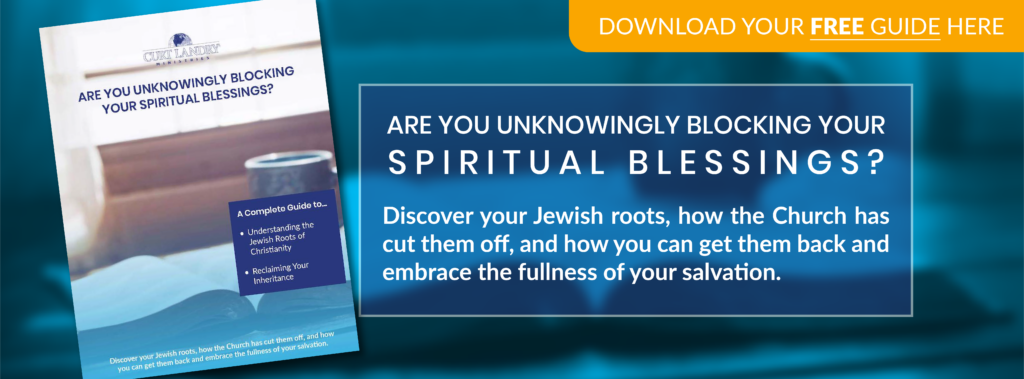The Great Commission in the Bible | A Hebraic Perspective (Part 1)
The Great Commission in the Bible is the final instruction that Jesus—or Yeshua, in Hebrew—gave His disciples: to “go therefore and make disciples of all nations…” according to Matthew 28:19.
This commission is understood to be an instruction for all born-again Believers to follow. The essence of the Great Commission in the Bible is to proclaim and teach of the salvation available to all people through Yeshua.
However, as with any instruction or scripture given in God’s Word, the more you study it… the more you meditate on it and pray about it… the more you consume it… the more revelation the Spirit will give you about it. Because the depths and riches of God’s ways and His greatness is “unsearchable” and eternal, so is His Word.
“‘For My thoughts are not your thoughts, nor are your ways My ways,’ says the Lord. ‘For as the heavens are higher than the earth, so are My ways higher than your ways, and My thoughts than your thoughts.’”—Isaiah 55:8-9
In this two-part series, The Great Commission in the Bible | A Hebraic Perspective, we will explore…
- What verses speak about the Great Commission in the Bible.
- The Great Commission in the Bible from a Western perspective.
- The Great Commission in the Bible from a Hebraic perspective.
- Why it is important to understand the Great Commission from a Hebraic perspective.
- What steps you can take to align more with God’s heart for the Great Commission.
Where Is the Great Commission in the Bible?
The Great Commission verses most often referenced are from Matthew 28:19-20. But there are other verses in the Bible we must consider that shed light on how to live the Great Commission.
We will discover more in Part 2 about how to pray, live, and proclaim the gospel of Yeshua HaMashiach, Hebrew for “Jesus, the Messiah” or “Jesus, the Anointed One.”
Matthew 28:16-20…
- “Then the eleven disciples went away into Galilee, to the mountain which Jesus had appointed for them. When they saw Him, they worshiped Him; but some doubted.
And Jesus came and spoke to them, saying, ‘All authority has been given to Me in heaven and on earth. Go therefore and make disciples of all the nations, baptizing them in the name of the Father and of the Son and of the Holy Spirit, teaching them to observe all things that I have commanded you; and lo, I am with you always, even to the end of the age.’ Amen.” (emphasis added)
Acts 1:8…
- “But you shall receive power when the Holy Spirit has come upon you; and you shall be witnesses to Me in Jerusalem, and in all Judea and Samaria, and to the end of the earth.” (emphasis added)
John 14:15-17, 23-24…
- “‘If you love Me, keep My commandments. And I will pray the Father, and He will give you another Helper, that He may abide with you forever—the Spirit of truth…’ Jesus answered and said to him, ‘If anyone loves Me, he will keep My word; and My Father will love him, and We will come to him and make Our home with him. He who does not love Me does not keep My words; and the word which you hear is not Mine but the Father’s who sent Me.’” (emphasis added)
Click HERE for Part 2 that provides more verses and deeper revelation into the Hebraic perspective.
The Great Commission in the Bible from a Western Perspective
It is clear from these verses, and many others, that Yeshua expected His disciples to follow, accurately teach, and spread what He taught about God’s Kingdom to the world.
And what did Yeshua teach?
That our soul—our mind, will, and emotions—and our spiritual being is to be shaped and molded by God…
- To fulfill our purposes
- To be empowered to obey His Word
- To give Him glory
- To trust His Word
In our Western culture, we often think of the Great Commission in the Bible as belonging only to missionaries who proclaim the gospel in foreign lands. But wherever God has placed you, that is your mission field.
Whether we are aware of the Westernized cultural influences on our perception of the Great Commission or not, they are present. Westernized thought reads, “Go therefore…” and thinks it is a command to leave where we are and venture into unknown territory proclaiming the gospel.
We can get overwhelmed with the thought and, therefore, begin to doubt and retract. The result then is that no steps are taken.
Though venturing into new territory is the calling for some Believers, this is not exactly what the Great Commission in the Bible says for all Believers.
The Great Commission in the Bible from a Hebraic Perspective
In Hebrew, the word for commandment is mitzvah. The Great Commission is a commandment; however, we must challenge our Western thought of the word command implied in commandment. Command suggests force, or even force with anger.
From the Hebraic perspective, the word mitzvah implies direction, such as a way for us to be guided in life.
When the word mitzvah—often translated as commandment in our Bibles—was used, it was in reference to God’s instruction for life that He gave to His people.
Jesus was saying, “If you love Me, keep my mitzvot” (John 14:15); and in the Great Commission, His instruction was: “… teaching them to observe all things that I have given you as mitzvot” (substituting the word mitzvot—plural of mitzvah—in place of commands or commandments). In the Greek text of the New Testament, the word here is entole: commandment, precept, meaning ‘focusing on the end-result of a command’—in essence, a mitzvah… a commandment causing us to focus on the end result… a guide for our life! (1)
Another Key Element in the Great Commission That Cannot Be Overlooked…
The phrase “go therefore,” as mentioned earlier in Matthew 28, can give the impression of venturing into new territory—something reserved only for missionaries in foreign lands.
However, from the Hebraic perspective, the phrase “go therefore” in this instance does not mean to immediately leap into action like it does from a Western perspective. Instead, it is about living a life that reflects the heart of God’s mitzvah—His teaching and commandment. We live according to the mitzvot (plural) that God established for His chosen people—Israel.
And where were these mitzvot that Yeshua taught from and about? In the Torah, the Old Testament.
Don’t Misunderstand This As Legalism…
This is not to say we must obey the laws of the Torah in order to be saved. But as Believers, we have a high calling.
We are saved.
We are justified.
We are sanctified.
All by the blood of Jesus. We have been given the gift of the Holy Spirit…
- “And being assembled together with them, He commanded them not to depart from Jerusalem, but to wait for the Promise of the Father, ‘which,’ He said, ‘you have heard from Me; for John truly baptized with water, but you shall be baptized with the Holy Spirit not many days from now.’”—Acts 1:4-5
…and, therefore, have access to the voice of God that guides us. Remember, in the Hebraic perspective, the mitzvah or command is thought of as a way to guide, direct, or point us in the right direction. It is when we respond to God’s instruction that we can know the ways in which we should go.
We are not meant to simply survive as followers of Yeshua, but to thrive—in His name. We are meant to be set apart.
How will we be set apart in this world?
By following God’s instruction—biblical principles—that He established in ancient Israel.
God has not changed. He has not decided that His ways no longer need to be followed, but He instead circumcised our hearts and gave us His Spirit so that we would be equipped to follow His mitzvot.
Then others will see Him through us!
“Not unto us, O Lord, not unto us,
but to Your name give glory,
because of Your mercy,
because of Your truth.”
—Psalm 115:1
In Part 2 of The Great Commission in the Bible | A Hebraic Perspective, we will examine…
- Why it is important to understand the Great Commission from a Hebraic perspective.
- What steps you can take to align more with God’s heart for the Great Commission.
Click HERE for Part 2!
(1) Ref. Strong’s g1785 and h4687.

